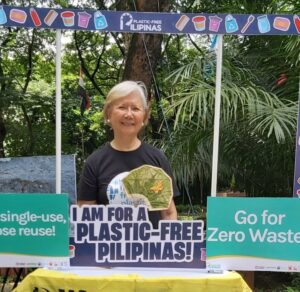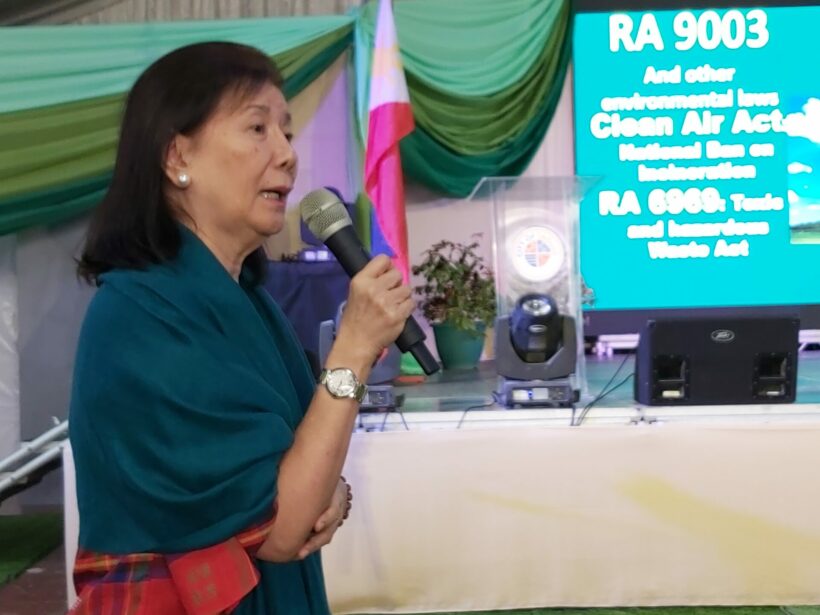Sonia Mendoza: Mother Earth’s Tireless Advocate
by Marlet Salazar

What started as Sonia Mendoza’s small-scale efforts to fix the uncollected garbage in her village has led to a lifelong commitment of advocating for Zero Waste. Her tireless campaigning together with like-minded individuals and groups led to the passage of the Clean Air Act of 1999 or RA 8749 which bans incineration in the country, and the Philippines’ Ecological Solid Waste Management Act of 2000, otherwise known as Republic Act (RA) 9003, which provides the national framework for decentralized solid waste management.
“I have always been close to the earth,” Sonia said. “I realize that it sustains you.”
Sonia’s family has always been into farming, and being close to nature taught her that everyone has the responsibility to care for it — a belief that she carried well into adulthood. Upon her early retirement as a laboratory manager from a pharmaceutical company in 1984, Sonia was often seen playing at the Philippine Columbian Association (PCA) indoor tennis courts. Still, she found she had so much time on her hands.
Always in tune with anything that concerns the environment, Sonia became aware of one of the biggest threats to clean air, which is the use of incinerators. She decided it was an issue worth devoting her time to, so she joined the Concerned Citizens Against Pollution (COCAP) in 1995 and participated in street rallies to put pressure on legislators for the passage of the Clean Air Act. After four years of campaigning, the Clean Air Act became a reality.
Journey to Zero Waste
Sonia’s journey to Zero Waste started in her own backyard. She and other village residents started segregating their waste when waste collectors did not show up for three weeks, causing a massive pileup of garbage in the streets.
“We followed what many waste management gurus (Luz Sabas and Dr. Metodio Palaypay) did at that time, which was to sort biodegradable from non-biodegradable waste,” she said. “We also did some composting and took care of our waste while waiting for the garbage pickup day.”
Sonia and fellow eco-crusader, Odette Alcantara, started giving lessons about waste segregation and composting to anyone who would listen — artists, housewives, local government officials, media — at the latter’s place. They also collected recyclables from homeowners who believed in their cause. Curious onlookers continued to multiply until they got media attention. The success of their solid waste management program led to the establishment of the non-government organization, Mother Earth Foundation (MEF), in 1998.
With Sonia as chair, MEF continued — at a more expanded level — what they have been teaching in their village, which was proper solid waste management. They have worked with local governments, specifically with the mayors, to adopt Zero Waste in their municipalities or communities through educational campaign programs. From the north to south of the Philippine archipelago, MEF has held seminars and workshops and assisted barangays with developing and implementing their Zero Waste programs.
In 2001, after the Ecological Solid Waste Management Act was passed, Sonia was selected to become part of the National Solid Waste Management Commission. Sonia’s work brought her to various places, from Puerto Princesa (Palawan) to the City of San Fernando, Pampanga.
Together with MEF, and then member-celebrities and environmentalists Chin Chin Gutierrez and Roy Alvarez, Sonia convinced former Mayor Edward Hagedorn of Puerto Princesa, Palawan to adopt RA 9003 when the local government put up a sanitary landfill in 2009. She told the chief executive that the landfill could last 50-75 years if they would only accept residual waste and the rest would be composted and recycled, as required by the new law.
Their work in Puerto Princesa was replicated in the City of San Fernando in 2012 and has since expanded to many other Philippine cities and communities. Most recently, the foundation helped the island province of Siquijor become the first Zero Waste island in the country.
Sonia finds fulfillment in being able to change someone’s mindset and preconceptions about Zero Waste, such as the notion that it is the sole responsibility of the government to manage municipal waste, as well as the throw-away mindset.
“For me, changing mindsets is one of the best outcomes of the Zero Waste program because it is long-term and we change the lifestyle of the people,” she said. She explained the two modules (inner ecology and solid waste) of MEF that enable her and the team to change people’s mindsets. The inner ecology module allows people to reflect on the task awaiting them. This will give them time to answer the whys and inspire them to become lifelong Zero Waste advocates who will benefit future generations.
“If we just teach them how to segregate without looking within their hearts and minds, there is a tendency that they may forget all about it as soon as we leave the training area,” Sonia said. “That’s why it is important for us to touch on inner ecology.”
By making it her lifelong mission to teach and train people about Zero Waste, Sonia remains a constant fixture in all the ventures of MEF. Her enthusiasm for community organizing and helping LGUs find solutions to the waste problem never wanes.
She shared that even when faced with the difficulty of convincing people to go Zero Waste, it never occurred to her to give up. “I just kept on going because, in the end, it will pay off, just like the Clean Air Act where we persistently rallied for the bill to be passed and it eventually did,” she said.
The other major payoff, shared Sonia, is the recent retraction of Ocean Conservancy (OC) of their 2015 report, Stemming the Tide, blaming countries in Southeast Asia, including the Philippines, as the biggest plastic polluters in the ocean and recognizing incineration as the proper solution for the plastic waste problem. After seven years, in July 2022, OC has agreed to do Restorative Justice to the countries adversely affected by their report, recognizing the Zero Waste solutions on the ground done by the different environmental groups in the Asia Pacific region as the more effective and environmentally sound solution to the waste problem.
“Hope springs eternal for me for the Philippines and for our Mother Earth,” she said, smiling. Take that from someone who has spent decades campaigning for issues she strongly believes in, and has seen massive successes.






